Classical Music CDs Round-Up 1 | reviews, news & interviews
Classical Music CDs Round-Up 1
Classical Music CDs Round-Up 1
Our views on old news?
Following last week's new music CDs round-up, The Arts Desk introduces our monthly pick of the latest classical music CDs, ranging from vocal showpieces and rare opera to viola transcriptions and string quartets.
Disc of the Month
Vivaldi: Farnace, Le Concert des Nations/Jordi Savall (3 CDs; Naïve)
 For anyone who still thinks of Antonio Vivaldi simply as the composer of The Four Seasons, it may come as a shock to learn not only that the manuscripts of over 450 of his other works are currently preserved in the archives of the National University Library in Turin but that since the year 2000 the independent French label Naïve has been embarked upon the Herculean task of issuing every single one of them on CD. Among the Turin library's collection are 15 operas (although Vivaldi is actually known to have composed at least 49), of which nine have so far been released by Naïve in brand-new studio recordings.
For anyone who still thinks of Antonio Vivaldi simply as the composer of The Four Seasons, it may come as a shock to learn not only that the manuscripts of over 450 of his other works are currently preserved in the archives of the National University Library in Turin but that since the year 2000 the independent French label Naïve has been embarked upon the Herculean task of issuing every single one of them on CD. Among the Turin library's collection are 15 operas (although Vivaldi is actually known to have composed at least 49), of which nine have so far been released by Naïve in brand-new studio recordings.
Recorded live during 2001 stage performances at the Teatro de la Zarzuela in Madrid, this strikingly theatrical period-instrument version of what seems to have been the Red Priest's own favourite amongst his later operas was in fact first released in 2002 on the conductor Jordi Savall's own label, Alia Vox, but now makes a more than welcome return in the Vivaldi Edition's characteristically eye-catching livery (and still comfortably filling three CDs, though now shorn of the insert arias by the Spanish-based Italian composer Francesco Corselli that had been added for the opera's 1739 Madrid run and were perhaps over-enthusiastically included in the original Alia Vox release).
A typical 18th-century confection of conflicting personal and political loyalties played out among the dysfunctional ruling dynasties of a far-flung corner of the early Roman Empire, Farnace shares a couple of main characters with better-known operas from the Age of the Castratos: Farnace himself (sung with his familiar vocal bite by the ever vital Furio Zanasi) is the same Pontian Prince who pops up in Mozart's early opera Mitridate, rè di Ponto, though he has since both won and lost his father's throne; while Pompeo (sung with her usual commanding authority by the contralto Sonia Prina) is none other than poor old Pompey the Great, whose severed head is served up on a plate to Julius Caesar at the start of Handel's great opera. The other key players are Tamiri, Farnace's wife (the lustrous Sara Mingardo, equally impressive in combative and plaintive mode); Berenice, the Amazonian Queen of Cappadocia (ably sung if slightly under-characterised by Adriana Fernández), who is hellbent on destroying Farnace even at the cost of her kingdom's survival and her own daughter's life; and Selinda, Farnace's scheming sister (Gloria Banditelli), who attempts to help her brother out by seducing both Pompey's and Berenice's first lieutenants.
One of Vivaldi's richest and most varied, as well as genuinely dramatic, scores – with several fine choruses, a duet and even a quartet enhancing the customary stream of solo arias – Farnace is full of startlingly original effects: one aria, for example, features a sustained pedal note for two horns, another has only muted strings for accompaniment, while a third, "Gelido in ogni vena" (All my blood runs cold), underscores Farnace's fear that his wife might actually have followed his orders, and murdered their only son, with icy dissonances blown straight in from the "Winter" landscapes of The Four Seasons. With the singers indulging in authentic real-time improvisation of embellishments in the repeat sections of their da capo arias, and the recitatives moving with all the added urgency and pace of a live performance, this has to be one of the most impressively realised recordings of a Vivaldi opera yet released.
Hear tracks at www.vivaldiedition.com
Also Recommended by Mark Pappenheim
Porpora: Arias, Karina Gauvin, Il Complesso Barocco/Alan Curtis (Atma Classique)
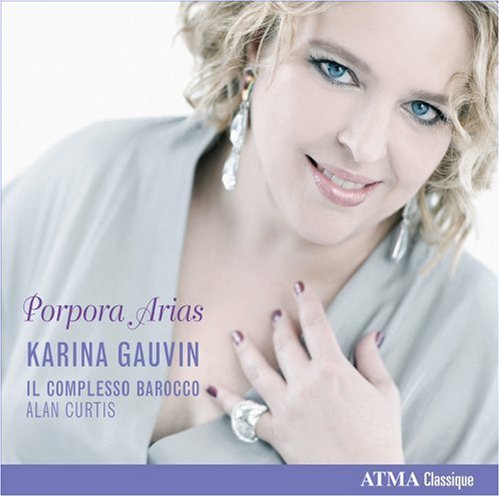 Where, until lately, it has seemed that every self-respecting opera singer had to record a solo Handel album, now that we’ve reached the composer’s 250th anniversary year (and possible saturation point on our CD shelves) it now seems that they must all record recitals by his rivals instead. So, hot on the heels of Lava, Simon Kermes’s coruscatingly volcanic survey of five key composers from the 18th-century Neapolitan school (on Deutsche Harmonia Mundi), and just ahead of the UK release, later this month, of Sacrificium, Cecilia Bartoli’s ballsy compendium of prime castrato cuts (on Decca), along comes Canada’s leading Baroque soprano Karina Gauvin (a major star of Alan Curtis and Il Complesso Barocco’s recent sets of Handel’s Ezio, Tolomeo and Alcina) with an album exclusively devoted to the music of Nicola Porpora.
Where, until lately, it has seemed that every self-respecting opera singer had to record a solo Handel album, now that we’ve reached the composer’s 250th anniversary year (and possible saturation point on our CD shelves) it now seems that they must all record recitals by his rivals instead. So, hot on the heels of Lava, Simon Kermes’s coruscatingly volcanic survey of five key composers from the 18th-century Neapolitan school (on Deutsche Harmonia Mundi), and just ahead of the UK release, later this month, of Sacrificium, Cecilia Bartoli’s ballsy compendium of prime castrato cuts (on Decca), along comes Canada’s leading Baroque soprano Karina Gauvin (a major star of Alan Curtis and Il Complesso Barocco’s recent sets of Handel’s Ezio, Tolomeo and Alcina) with an album exclusively devoted to the music of Nicola Porpora.
Though habitually written off in the music history books (British ones anyway) as the man whom the Prince of Wales’s supporters parachuted into London to challenge Handel’s 20-year reign over the capital’s operatic stage, only for the Neapolitan challenger to retreat defeated back to the Continent less than three years later, Porpora was no musical nobody: not just a major composer who held key appointments in Naples, Venice and Dresden, he was also one of the leading singing teachers of his day and numbered amongst his pupils several of the most famous castratos of the age – including both Farinelli and Caffarelli – as well as the librettist Metastasio and, as a composition pupil cum valet, the young Joseph Haydn. In here giving us scenes and arias from six of Porpora’s 50-odd operas, including six world premiere recordings, Gauvin’s CD, like Kermes’s, proves a total revelation, triumphantly banishing any idea that Handel’s opera seria rivals were all, as we’ve so long been led to believe by post-Gluckian propagandists, mere production-line purveyors of crowd-pleasing vocal pyrotechnics to be delivered by over-trained, under-sexed theatrical freaks.
With Gauvin’s beautifully modulated, bright, pearly-toned voice easily encompassing every technical challenge to the point where “decoration” serves only to depict, not distract from, the expression of feeling (and she really feels the words too), plus richly colourful support from Curtis’s intensely responsive band, Porpora’s music emerges afresh as not only intrinsically dramatic but powerfully individual as well, even when, as in Fulvia’s great grief-stricken scena “Misera, dove son?” from Ezio, it goes head-to-head with a more familiar setting by Handel himself (as already recorded by Gauvin in Curtis’s complete Archiv set). Given the chameleon mastery of changing moods displayed in the six substantial extracts from Arianna in Naxo – Porpora’s first salvo in the London opera wars of 1733–36 – it’s no wonder that Handel felt compelled to come up with two such supreme masterpieces as Ariodante and Alcina in a single season in order to retaliate. That alone would be one good reason to be grateful to Porpora; this splendid disc gives us a few more.
Watch related video below
Handel: Organ Concertos Op.7, Academy of Ancient Music/Richard Egarr (2 CDs; Harmonia Mundi)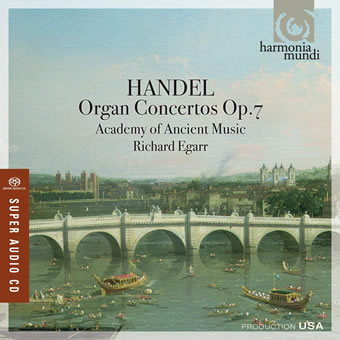 Where once the star castratos had been the principal draw to Handel’s London operas, the chance to hear the composer himself playing the organ soon became one of the added attractions for audiences attending the first nights of the English oratorios he wrote during the last two to three decades of his life following Italian opera's final fall from fashion. Posthumously published in 1761, the concertos that comprise Handel’s Op.7 were all composed between 1740 and 1751, and variously premiered at performances of such oratorios as L’Allegro, il Penseroso ed il Moderato, Samson, The Choice of Hercules, Alexander’s Feast and Theodora. The music itself is a constant delight – by turns sonorous, stately, sensual, playful, pastoral, processional – and is here performed by Richard Egarr (playing the deliciously liquid-toned Handel House Museum chamber organ now lodged in St George’s Church, Hanover Square) and an oboe- and bassoon-enriched Academy of Ancient Music with such virtuoso flair and flamboyant spontaneity – with Egarr filling the several “Ad libitum” movements with authentic real-time improvisations rather than the pre-prepared organ transcriptions of existing Handel works usually heard in performance – that one could almost believe old Handel himself had popped up, cinema organist style, through the floorboards.
Where once the star castratos had been the principal draw to Handel’s London operas, the chance to hear the composer himself playing the organ soon became one of the added attractions for audiences attending the first nights of the English oratorios he wrote during the last two to three decades of his life following Italian opera's final fall from fashion. Posthumously published in 1761, the concertos that comprise Handel’s Op.7 were all composed between 1740 and 1751, and variously premiered at performances of such oratorios as L’Allegro, il Penseroso ed il Moderato, Samson, The Choice of Hercules, Alexander’s Feast and Theodora. The music itself is a constant delight – by turns sonorous, stately, sensual, playful, pastoral, processional – and is here performed by Richard Egarr (playing the deliciously liquid-toned Handel House Museum chamber organ now lodged in St George’s Church, Hanover Square) and an oboe- and bassoon-enriched Academy of Ancient Music with such virtuoso flair and flamboyant spontaneity – with Egarr filling the several “Ad libitum” movements with authentic real-time improvisations rather than the pre-prepared organ transcriptions of existing Handel works usually heard in performance – that one could almost believe old Handel himself had popped up, cinema organist style, through the floorboards.
As extra bonuses, we not only get what Egarr thinks is the world premiere recording of the organ-concerto-version of the unpublished Air lentement in Concerto No.6, but also the popular “The Cuckoo and the Nightingale” concerto – with added bird calls – and three solo harpsichord pieces, including an expansive G major Chaconne which, as Egarr points out in his notes, pre-echoes the ground bass and harmonic pattern that Bach was later to use in his “Goldberg” Variations. Definitely one of the more attractive among the many new CDs released this year to mark the 250th anniversary of Handel’s death.
Arnold: Ballet Music, BBC Philharmonic/Rumon Gamba (Chandos)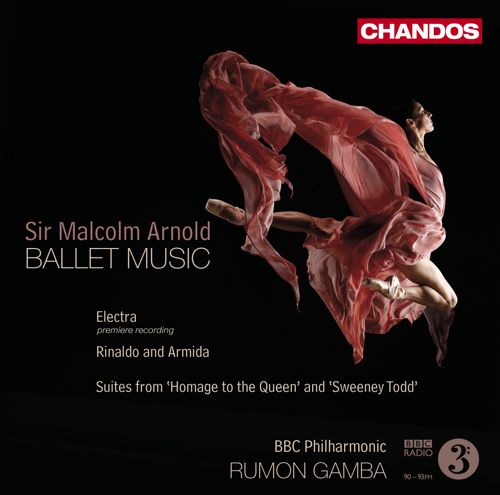 Here are four ballet scores that show several very different sides to the late Sir Malcolm Arnold from the jokily Hoffnungesque A Grand, Grand Overture (with obbligato parts for three vacuum cleaners, a floor polisher and rifle quartet) heard at the Last Night of the Proms last month or his Oscar-winning film score for Bridge on the River Kwai. Homage to the Queen – composed to mark our current monarch's coronation in 1953, and originally planned as a curtain-raiser for Britten's Elizabeth-and-Essex opera Gloriana before Benjy threw a queeny fit and refused to have it on the same bill – opens and closes with predictably fanfaring pomp, but contains a suite of delightfully contrasted dances for the queens of the four elements, including a translucent vision of Water that begins as one part Stravinsky's Apollo to two parts Saint-Saëns's Aquarium and an airily Ravelian pas de deux.
Here are four ballet scores that show several very different sides to the late Sir Malcolm Arnold from the jokily Hoffnungesque A Grand, Grand Overture (with obbligato parts for three vacuum cleaners, a floor polisher and rifle quartet) heard at the Last Night of the Proms last month or his Oscar-winning film score for Bridge on the River Kwai. Homage to the Queen – composed to mark our current monarch's coronation in 1953, and originally planned as a curtain-raiser for Britten's Elizabeth-and-Essex opera Gloriana before Benjy threw a queeny fit and refused to have it on the same bill – opens and closes with predictably fanfaring pomp, but contains a suite of delightfully contrasted dances for the queens of the four elements, including a translucent vision of Water that begins as one part Stravinsky's Apollo to two parts Saint-Saëns's Aquarium and an airily Ravelian pas de deux.
Dating from a year later, Rinaldo and Armida is based on the same epic tale of the crusader hero and the Saracen enchantress that inspired Handel's London debut opera in 1711: essentially just a single 20-minute pas de deux, this "dance-drama in one act" echoes both Stravinsky's Firebird in its eerie magic-garden setting and Dukas's La Péri in its concise storytelling, as the fabled seducer duly finds herself seduced before dying gracefully upon a kiss.
Twenty years before Sondheim wrote Sweeney Todd the musical, Arnold composed Sweeney Todd the ballet, premiered by the Royal Ballet on its 1959 tour, with Alix Stone designs inspired by the penny-plain-tuppenny-coloured world of Victorian toy theatres. The score, like poor old Arnold himself, reveals itself as equally bipolar, as an ominously dramatic opening gives way to jaunty St Trinian's-style barrel-organ swagger – John Cranko's choreography apparently featured Keystone Kops routines for its bumbling Fleet Street bobbies. But soon any comedy turns dark and dangerous, as Arnold's music begins to sound a bit like a less angular version of Bartók's The Miraculous Mandarin, though all ends happily with a costermongery celebration of "Virtue Triumphant", complete with parodistically lovey-dovey bird calls.
Finally, from 1963, comes Electra, a one-act, 15-minute synthesis of Sophocles, originally choreographed by Robert Helpmann with Monica Mason (the Royal Ballet's current Director) as Clytemnestra. Mainly powered by a large percussion ensemble, with savage dances over barbaric bongo beats, driving motor rhythms, screeching dissonances and an extraordinary passage of harp and brass glissandos before the final frenzied climax, the work here receives its premiere recording and is performed, like everything else on the disc, with real panache by Rumon Gamba and the BBC's Manchester band.
Tippett: String Quartets Nos. 3 & 5, The Tippett Quartet (Naxos)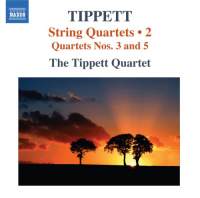 Founded in 1998, the year of Michael Tippett’s death, this bright young quartet offers vital, sinewy, emotionally and intellectually engaged performances of two of the great visionary’s five quartets – music that is never “easy” but always richly rewarding in its Beethovenian mix of profound logic and soaring lyricism. Composed in the wake of World War Two, just before his mystical first opera The Midsummer Marriage, the five-movement Quartet No. 3 exudes much the same spirit of rapturous ecstasy, alternating with angular, energetic fugues. Dating from the early 1990s, and featuring extended variations on the melismatic entrance aria for Pelegrin, the space traveller, from Tippett’s final sci-fi opera New Year, the two-movement Fifth Quartet is all about song, with multiply singing, sighing, swooning, sometimes dancing lines building to a resolution of brief radiance. Recorded in far better sound than the Lindsays’ pioneering recorded accounts, this CD and its companion set of Nos. 1, 2 & 4 (released last year) are surely now the No.1 choice for anyone who wants (in the old trendies’ phrase) to “turn on to Tippett”, especially at Naxos’s bargain price.
Founded in 1998, the year of Michael Tippett’s death, this bright young quartet offers vital, sinewy, emotionally and intellectually engaged performances of two of the great visionary’s five quartets – music that is never “easy” but always richly rewarding in its Beethovenian mix of profound logic and soaring lyricism. Composed in the wake of World War Two, just before his mystical first opera The Midsummer Marriage, the five-movement Quartet No. 3 exudes much the same spirit of rapturous ecstasy, alternating with angular, energetic fugues. Dating from the early 1990s, and featuring extended variations on the melismatic entrance aria for Pelegrin, the space traveller, from Tippett’s final sci-fi opera New Year, the two-movement Fifth Quartet is all about song, with multiply singing, sighing, swooning, sometimes dancing lines building to a resolution of brief radiance. Recorded in far better sound than the Lindsays’ pioneering recorded accounts, this CD and its companion set of Nos. 1, 2 & 4 (released last year) are surely now the No.1 choice for anyone who wants (in the old trendies’ phrase) to “turn on to Tippett”, especially at Naxos’s bargain price.
Britten & Szymanowski: Violin Concertos, Frank Peter Zimmermann, Swedish Radio SO/Manfred Honeck, Warsaw Philharmonic/Antoni Wit (Sony Classical)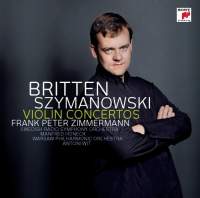 How many living violinists, one wonders, can match the sheer technical command and concentrated tonal purity of Frank Peter Zimmermann, whose sweetly singing legato here draws added warmth and strength from a Strad once played by Fritz Kreisler? With wonderfully idiomatic support from Antoni Wit and the Warsaw Philharmonic, he seems equally at ease rhapsodising ecstatically over the iridescently shimmering orchestral tapestry of Karol Szymanowski’s exotically impressionistic, free-flowing First Concerto (inspired by the pantheistic vision of Micinski’s poem May Night) as he is tackling the more robust, even rumbustious rhythms of the Second (with its haunting echoes of the folk music of the composer’s beloved Tatra Mountains). But perhaps most impressive of all is the endlessly restless, yearning, questing, questioning line that Zimmermann spins across the timpani-troubled textures and passacaglia-based processionals of the darkly foreboding concerto that Britten, the pacifist, wrote in 1939 while seeking sanctuary across the Atlantic from the gathering clouds of war back home.
How many living violinists, one wonders, can match the sheer technical command and concentrated tonal purity of Frank Peter Zimmermann, whose sweetly singing legato here draws added warmth and strength from a Strad once played by Fritz Kreisler? With wonderfully idiomatic support from Antoni Wit and the Warsaw Philharmonic, he seems equally at ease rhapsodising ecstatically over the iridescently shimmering orchestral tapestry of Karol Szymanowski’s exotically impressionistic, free-flowing First Concerto (inspired by the pantheistic vision of Micinski’s poem May Night) as he is tackling the more robust, even rumbustious rhythms of the Second (with its haunting echoes of the folk music of the composer’s beloved Tatra Mountains). But perhaps most impressive of all is the endlessly restless, yearning, questing, questioning line that Zimmermann spins across the timpani-troubled textures and passacaglia-based processionals of the darkly foreboding concerto that Britten, the pacifist, wrote in 1939 while seeking sanctuary across the Atlantic from the gathering clouds of war back home.
Il bel sogno, Inva Mula, Zagreb Philharmonic Orchestra/Ivo Lipanovic (Virgin Classics)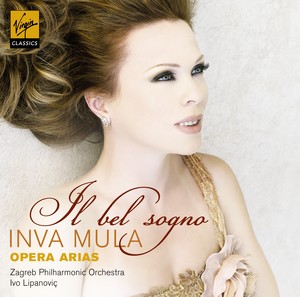 The Albanian-born soprano Inva Mula was a prizewinner at the first Plácido Domingo Operalia competition back in 1993 and went on to win something of a cult following among younger movie-goers as the voice of the tentacle-headed diva Plavalaguna (warbling the Mad Scene from Donizetti’s Lucia) in Luc Besson’s 1997 sci-fi fantasy The Fifth Element. She has since gone on to sing at most of the world’s major opera houses and made welcome guest appearances in the Gheorghiu/Alagna recordings of Carmen and La Rondine. It’s a bit of a pity therefore that Virgin has left it so late to release this solo disc of calling-card numbers from Mula's French and Italian repertoire: she was clearly not in best voice at all the sessions – the title track in particular, Magda’s “Dream Song” from La Rondine, suffers from spreading tone and insecurity on the crucial top notes (and it can’t have helped in “Sempre libera” that the off-stage tenor is a bleating embarrassment) – but there remain nevertheless a delicate bloom and limpid clarity to the voice itself and a striking honesty and immediacy of expression in the way it’s used that can still be deeply affecting, especially in moments of vulnerable introspection such as Thaïs’s “Mirror Aria” or Violetta’s deathbed farewell, “Addio del passato”, from La traviata.
The Albanian-born soprano Inva Mula was a prizewinner at the first Plácido Domingo Operalia competition back in 1993 and went on to win something of a cult following among younger movie-goers as the voice of the tentacle-headed diva Plavalaguna (warbling the Mad Scene from Donizetti’s Lucia) in Luc Besson’s 1997 sci-fi fantasy The Fifth Element. She has since gone on to sing at most of the world’s major opera houses and made welcome guest appearances in the Gheorghiu/Alagna recordings of Carmen and La Rondine. It’s a bit of a pity therefore that Virgin has left it so late to release this solo disc of calling-card numbers from Mula's French and Italian repertoire: she was clearly not in best voice at all the sessions – the title track in particular, Magda’s “Dream Song” from La Rondine, suffers from spreading tone and insecurity on the crucial top notes (and it can’t have helped in “Sempre libera” that the off-stage tenor is a bleating embarrassment) – but there remain nevertheless a delicate bloom and limpid clarity to the voice itself and a striking honesty and immediacy of expression in the way it’s used that can still be deeply affecting, especially in moments of vulnerable introspection such as Thaïs’s “Mirror Aria” or Violetta’s deathbed farewell, “Addio del passato”, from La traviata.
Elgar & Schnittke: Viola Concertos, David Aaron Carpenter, Philharmonia Orchestra/Christoph Eschenbach (Ondine)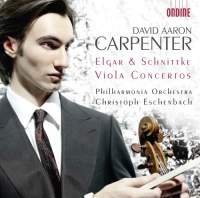 One can quite understand why viola players might want to colonise the Elgar Cello Concerto – their native repertoire is not exactly well stocked with popular English Romantic masterpieces – but I’m not entirely sure why audiences should want to encourage these territorial ambitions while the world is still full of enough fine cellists to perform the original. The viola is, quite literally, a lesser instrument than a cello and the Elgar concerto is incontrovertibly a lesser piece when played upon it: shorn of its more complex resonances, with its rasping depths never truly plumbed and its highs too lightly attained, it’s like Elgar on Prozac, more rhapsodic than elegiac.
One can quite understand why viola players might want to colonise the Elgar Cello Concerto – their native repertoire is not exactly well stocked with popular English Romantic masterpieces – but I’m not entirely sure why audiences should want to encourage these territorial ambitions while the world is still full of enough fine cellists to perform the original. The viola is, quite literally, a lesser instrument than a cello and the Elgar concerto is incontrovertibly a lesser piece when played upon it: shorn of its more complex resonances, with its rasping depths never truly plumbed and its highs too lightly attained, it’s like Elgar on Prozac, more rhapsodic than elegiac.
Yet here, 20 years after Rivka Golani made the world premiere recording of Lionel Tertis’s viola transcription (conducted by the late “Tod” Handley), along comes a new recording (his debut CD) by the prodigiously talented 23-year-old New Yorker David Aaron Carpenter and one has to confess that, if the counterfeit has to be carried out at all, one can’t imagine it better done. On its own terms, Carpenter delivers a strong but deeply sensitive reading, full of subtle inflections, with a lovely mellow tone and supple through-line – though the most powerful argument in favour of Tertis’s arrangement, namely that the septuagenarian Elgar himself approved and even conducted it, is surely undermined by the fact that Carpenter has seemingly rearranged much of it himself, including rejecting the tuning-down of the C string for the third movement that, according to Tertis’s memoirs, Elgar specifically insisted he keep in!
No such cavils about the coupling, though. Written for Carpenter’s sometime teacher, Yuri Bashmet, Alfred Schnittke’s 1985 Viola Concerto is arguably his masterpiece and makes an apt thematic partner for the Elgar, given its equally nostalgic scenario of a life looked back upon from the threshold of death – and a sadly prophetic scenario too, since Schnittke himself suffered a debilitating stroke just 10 days after completing the work. Carpenter’s is an amazingly assured performance, totally in command of the music’s every fleeting mood-swing and passing polystylistic reference, and deeply affecting too, not least in the weird central episode where the viola muses to a tinkling tea-dance waltz like an Alzheimer sufferer dreaming of lost memories, or the quiet closing bars where the soloist resignedly relaxes his grip on the pulse of life.
The future of Arts Journalism
You can stop theartsdesk.com closing!
We urgently need financing to survive. Our fundraising drive has thus far raised £49,000 but we need to reach £100,000 or we will be forced to close. Please contribute here: https://gofund.me/c3f6033d
And if you can forward this information to anyone who might assist, we’d be grateful.

Subscribe to theartsdesk.com
Thank you for continuing to read our work on theartsdesk.com. For unlimited access to every article in its entirety, including our archive of more than 15,000 pieces, we're asking for £5 per month or £40 per year. We feel it's a very good deal, and hope you do too.
To take a subscription now simply click here.
And if you're looking for that extra gift for a friend or family member, why not treat them to a theartsdesk.com gift subscription?

Add comment